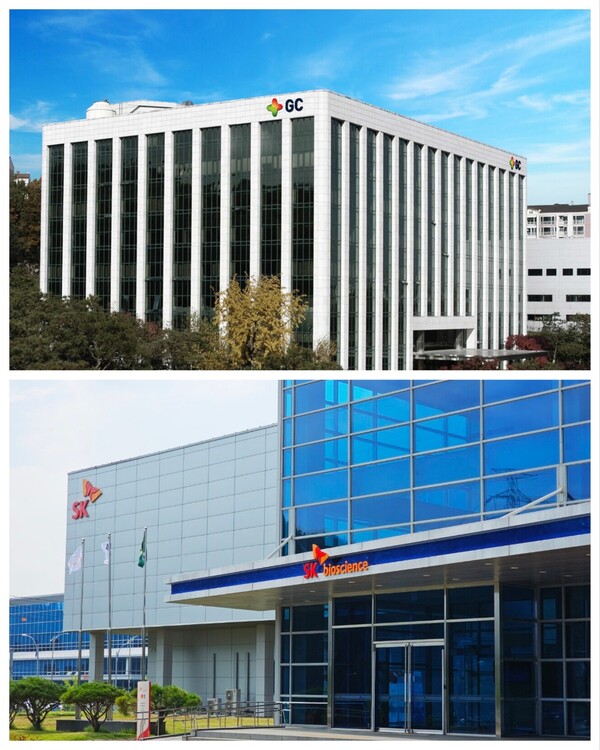Many Korean pharma and biotech companies posted record-breaking results last year. Still, those focusing on the vaccine business, including GC Biopharma and SK bioscience, performed relatively poorly as the Covid-19 pandemic eased to an endemic.
According to GC Biopharma’s preliminary consolidated operating results for 2023, the company posted sales of 1.62 trillion won ($1.21 billion) and operating profit of 34.4 billion won. These were 4.9 percent and 57.6 percent year-on-year declines, resulting in a net loss of 19.8 billion won.

GC Biopharma attributed the sales slump to a sluggish domestic business for flu vaccines due to a decrease in Covid-19 demands as a result of the endemic, and a sharp drop in sales of Hunterase, a high-margin item, due to the Russia-Ukraine war. Hunterase is a treatment for Hunter syndrome, and Russia is the top sales destination among the 13 countries that import Hunterase.
The company plans to increase sales by expanding new businesses, including Alyglo, which will be launched in the U.S. in the second half of the year, plant technology export to Indonesia, and contract manufacturing (CMO). Alyglo is a 10 percent immunoglobulin for intravenous administration used for Primary Humoral Immunodeficiency, also known as congenital immunodeficiency. It won approval from the U.S. Food and Drug Administration (FDA) last December.
"There was a temporary decline in profitability due to increased R&D investment centered on rare disease treatments, sluggish sales of Hunterase, a high-margin product, and a decline in domestic flu vaccine sales due to the endemic," a company official said. "We expect mid-single-digit turnover growth if the sales of products, including shingles vaccine Shingrix, expand and new businesses take their roots."
SK bioscience, another vaccine major, had a disappointing performance last year. The company posted consolidated sales of 369.5 billion won, and an operating loss of 12 billion won last year. Revenue was down 19.1 percent from the previous year, and operating income turned into a loss.
According to SK bioscience, the decline was due to lower sales as the Covid-19 pandemic became an endemic. The company benefited from the Covid-19 vaccine contract manufacturing organization (CDMO) agreement with Novavax during the pandemic. Still, its balance sheet turned into a loss due to the absence of account receivable expenses following the termination of the agreement and increased R&D spending.
SK bioscience plans to improve its performance by focusing on R&D investment based on its cash reserves. As of the fourth quarter of 2023, SK bioscience had net cash reserve of 1.27 trillion won and a low debt-to-equity ratio of 8.7 percent.
To improve its R&D infrastructure, SK b0ioscience will expand its plant in Andong, North Gyeongsang Province, and prepare for clinical trials of the next-generation coronavirus vaccine, Pan-Sarbeco, and the mRNA Japanese encephalitis vaccine it is developing with the Center for Epidemic Preparedness and Innovation (CEPI).
"PCV21, a pneumococcal vaccine currently under development, will enter phase 3 clinical trials globally, including the U.S., this year, and the new Ebola vaccine is also nearing the commercialization stage," a company official said. "We will expand our global vaccine portfolio, including next-generation blockbusters, and expand our cGMP facilities to enter developed markets in earnest to increase sales."
Related articles
- GC Biopharma’s operating profit halved due to plasma cost rises in 2023
- GSK's Shingrix vaccine linked to higher risk of ‘ophthalmic zoster’ recurrence: study
- SK bioscience gets WHO Pre-Qualification for typhoid conjugate vaccine
- Yuhan’s Leclaza, GC Biopharma’s Alyglo win 'grand prize in new drug development'
- SK bioscience celebrates a decade of collaboration with Sanofi through expansion of vaccine plant
- SK bioscience paves way for exporting SKY Cellflu to southern hemisphere
- Why is Shingrix, the only shingles vaccine available for cancer patients, so painful?

